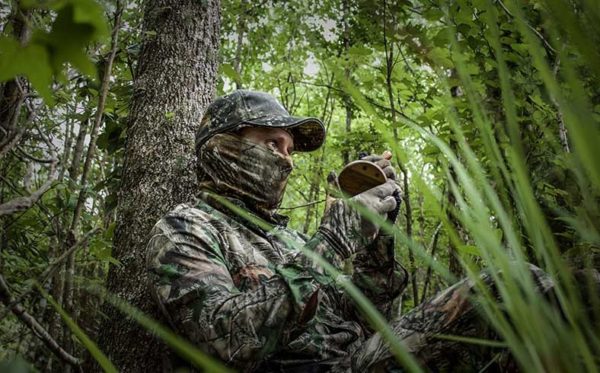21 Surefire Tips for Snagging Wild Turkey This Spring
By OutdoorHub
Like springtime weather, wild turkeys are often fickle. Just when you think you have a longbeard patterned, his pea-sized brain directs him to change his routine, leaving you frustrated.
While it’s easy to give up, those hunters who are successful keep swinging for the fences. After all, it takes only a split-second for you to go from zero to hero in the spring turkey woods.
Of course, as with any type of hunting, solid preparation is imperative. And serious turkey hunters are prepared to deal with any situation. You can’t control everything that will factor into the outcome on any given day, but it only makes sense to leave as few things as possible to chance.
From a gear standpoint, turkey hunting can be as simple or complicated as you choose to make it. Some guys and gals bring a truckload of calls in their turkey vest and cycle through most of them during a single morning hunt. Others carry only a single mouth call. Whichever camp you fall into, it still makes sense to get your gear—and your mindset—in order prior to opening morning. To help in this endeavor, here are 21 tips to ensure you’re prepared for the 2018 spring turkey season.

1. Inspect and try on clothing and footwear. It may be time to replace a faded pair of hunting pants or leaky boots. While turkeys aren’t known for their sense of smell, deer are, and nervous whitetails have ruined countless turkey hunts when they blew and ran right as Ol’ Tom was strutting into the decoys. If you’re shopping for new turkey duds, consider buying lightweight scent-control apparel like any one of ScentLok’s many Early Season designs.
2. Packable rain suits are game changers when faced with crummy weather. Check for rips and tears that need mending. This vital piece of gear is often put away wet and ends up having that smell. This is a great time to wash them. Run-and gun-hunters who don’t have a rain suit should seriously consider the investment.
3. Use a large tote such as a Plano Sportsman’s Trunk to store clothing critical gear so you’re always organized and ready to go. If you want to keep your clothing as scent-free as possible, keep it in the ozone and activated carbon-powered OZ Chamber 8k Storage Bag by ScentLok.
4. Remove everything from your turkey vest and make sure the zippers and buckles are working okay, and repair as needed. Again, they don’t last forever and it may be time for a new one.
5. Wash or replace that stinky facemask and make sure you have a backup or two available.
6. Go through calls and make sure all of them are in working order—prep them for active duty. Diaphragm calls are often in poor condition and need to be replaced. Take an inventory of what you need and stock up. Keep worn-in mouth calls you’ve practiced with in your vest ready to hunt and have extras available.
7. Be sure your vest has other essentials such as biodegradable wipes, insect repellent, lens wipes and an energy bar or two.
8. It’s always good to have backup items such as camo gloves and facemasks, especially if you plan on taking others hunting.
9. Pattern your shotgun. Try to replicate actual hunting conditions when possible by wearing full head camo, vest and boots. Shoot while leaning against a backrest like you would during an actual hunt.
10. Pattern guns with different loads and choke combos. Inexperienced hunters and youths who may have difficulty holding the gun steady should consider using a slightly more open choke that offers a bigger pattern inside of 30 yards. Practice in the comfort zone, not ridiculously long ranges that increase the odds of missing or wounding birds.
11. Practice with lighter loads that don’t promote a flinch. Use the big stuff during the actual hunt. Smaller statured hunters should consider using a 20 gauge that offers less weight and reduced recoil.
12. Clean and adjust your binoculars so they work perfectly for you. If they aren’t working properly or have terrible optics, consider buying some good ones. Also, reputable manufacturers back their glass with great warranties. If your good ones aren’t functioning properly, then contact the company to learn about your options.
13. Devices that protect your binoculars and keep them close to your chest are great for turkey hunting. Specialized products such as the Tenzing TZ OSS15 are invaluable for protecting high-quality glass during the hunt.
14. Store your go-to decoys in a big tote and keep it in your vehicle so you don’t forget them in the garage or basement. Today’s decoys work better because they are incredibly realistic. Some are also durable, collapsible and fit neatly into a provided carry bag, such as the broad range of poses and sub-species available in Avian-X’s LCD series. Turkeys aren’t getting any dumber, so it’s time to get serious about your decoys.
15. Even if you don’t hunt from a ground blind often, have one ready for inclement weather or when you have a fidgety hunting partner. They’re also great for early season hunts when there isn’t a lot of vegetation for cover. Select one that has enough room for two or three hunters like the innovative new Ameristep Distorter.
16. Run-and-gun turkey hunters are best served by a smaller three panel blind like the Ameristep Throwdown Blind. This ultra portable model weighs less than 2 pounds fits easily into a turkey vest.
17. If you hunt public land, make sure no rules have changed since last season.
18. If you hunt private land, be sure and check-in with landowners. Ask if anybody else is hunting, where you can and cannot park, etc.
19. If you plan on traveling, be sure you can get permits. Some states offer leftovers; if you missed the draw or didn’t get in, there still may be hope.
20. Consistently successful turkey hunters never leave well enough alone when it comes to hunting spots. Do your homework and scout the countryside. Always shoot for a net gain of hunting property with each new season.
21. Last but not least, start scouting religiously. Be there early to listen to birds before fly down, then take a ride and see where they are spending time. Do the same in the afternoon. Right before the season, roost a few gobblers to make sure you have options on opening morning.
With a little bit of preparation and planning, your chances of tagging a turkey increases tremendously. Like most things in life, you can expect to get out what you put in—it’s all about effort.
Article Courtesy of OutdoorHub from Land.com
21 Surefire Tips for Snagging Wild Turkey This Spring

The Boehm Team | (830) 428-8106 | info@MyBoehmTeam.com
Texas Ranches for Sale
Featured Properties
